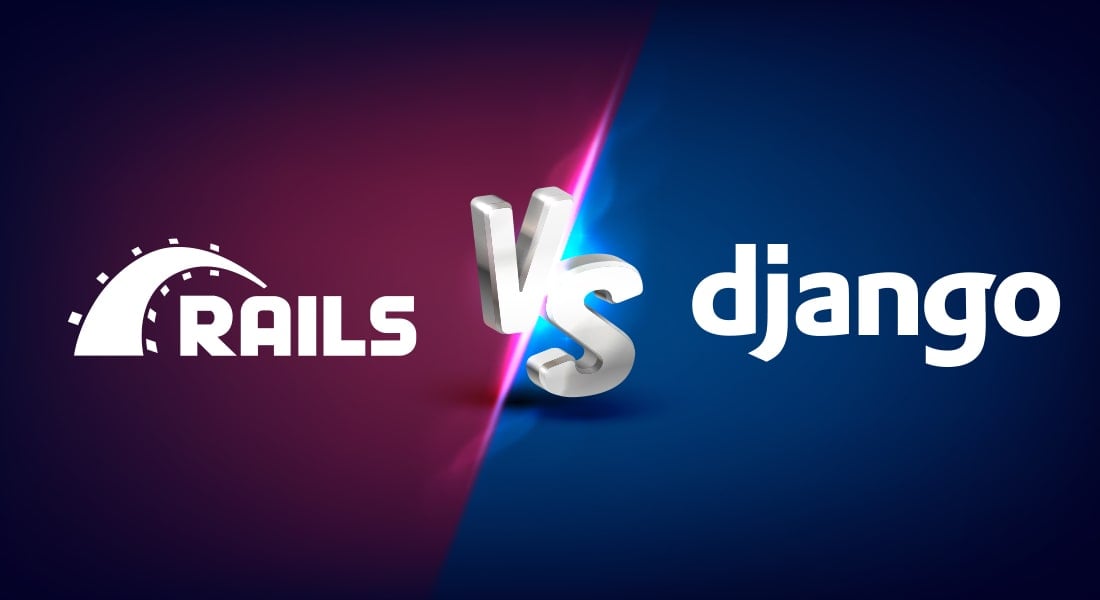There exists a vast array of web server development frameworks in the programming industry. However, both Django and RoR web frameworks have surfaced as the most preferred options due to their well-established reputation, large community, and global usage. These languages are known for providing a solid foundation for any digital product.
The choice of the appropriate web development service often depends on the skills and experience of the developer, as well as its impact on the functionality of the product, development resources, and maintenance expenses. To ensure maximum performance and efficiency during the product development process, numerous Python Django development companies compare the fundamental features of Django and Ruby on Rails.
If you’re unsure about which framework to choose between Rails vs Django in 2023 to meet your business requirements, fret not! Hoff & Mazor’s app development Team have already done the research for you.
What is the Difference Between Django & Ruby on Rails? (Django vs Rails Comparison)
The main aspects that differentiate the two web development frameworks, Django and Ruby on Rails are:
| Ruby on Rails | Django |
| Programming Language | |
| Ruby on Rails uses the Ruby programming language. | Django uses Python as its programming language. |
| Performance & Speed | |
| Ruby on Rails may be slightly faster. | Django may be comparatively slower. |
| Developer Control & Facilitation | |
| Ruby on Rails has a more standardized structure, making it easier for developers to get started; but it provides less control over the project structure and implementation. | Django has a steeper learning curve due to its explicit configuration approach and it offers more control and customization options; but this may also require more development time. |
| Design Philosophy | |
| Ruby on Rails emphasizes convention over configuration, which means that it comes with a set of pre-defined conventions for developers to follow. | Django follows the principle of “explicit is better than implicit,” which means that developers have more control over the project’s structure and implementation. |
| Community Support | |
| Ruby on Rails has a large community of active & supportive followers. | Django has a comparatively smaller following. |
| Licensing | |
| Ruby on Rails is released under the MIT License. | Django is released under the BSD license. |
| Templates | |
| Ruby on Rails uses ERB templates. | Django uses its own template language. |
| ORM & Routing | |
| Ruby on Rails uses Active Record as its Object-Relational Mapping (ORM) tool and it has a built-in routing system | Django uses its own ORM called Object-Relational Mapping (ORM) tool and it uses a separate URL routing configuration. |
| Applications | |
| Ruby on Rails is popular for building web applications such as Basecamp, GitHub, and Shopify. | Django is commonly used for building content-based websites, news portals, and social networks like Instagram, Pinterest, and The Washington Post. |
Are Django & Ruby on Rails the Same?
While Django and Ruby on Rails are different web development frameworks built using different programming languages, they do share some similarities. Here are some of the similarities between Django and Ruby on Rails:
Same Architecture
Both frameworks follow the Model-View-Controller (MVC) architecture, which separates an application into three interconnected parts: the model, which handles data and logic; the view, which displays data to the user; and the controller, which manages user input and updates the model and view accordingly.
Quick & Easy Development
Both frameworks aim to make web development faster and easier. Django and Ruby on Rails come with many built-in features and libraries that speed up the development process, allowing developers to focus on building the core functionality of the application.
Free to Use
Both Django and Ruby on Rails are open-source frameworks, which means that they are free to use, modify, and distribute. This makes it easier for developers to get started with web development without incurring any licensing costs.
Supportive Communities
Both frameworks have active communities of developers and users who contribute to their development, provide support, and share resources. This makes it easier for developers to find answers to their questions and stay up-to-date with the latest best practices and trends in web development.
Which One to Choose: Django or Ruby on Rails?
Both Django and Ruby on Rails are powerful web development frameworks with their own unique strengths and use cases. The choice between them depends on the specific needs and requirements of the web development project.
Choosing Django for Web Development
If you are thinking of choosing Django framework for web development, look through these pros and cons before making your decision:
Pros of Django for Web Development
- Scalability: Django is highly scalable and can handle large-scale web applications with ease.
- Built-in security features: Django provides several built-in security features, such as protection against SQL injection, cross-site scripting, and clickjacking, making it easier to build secure web applications.
- Versatility: Django is a versatile framework that can be used for a wide range of web development projects, including content-based websites, e-commerce, and social networks.
- Rapid Development: Django provides several built-in features such as an admin interface, ORM, and templating engine, making it easier to get started with web development projects quickly.
- Large community: Django has a large and active community of developers who contribute to the framework’s growth and offer support through various channels such as online forums, meetups, and conferences.
Cons of Django for Web Development
- Steep learning curve: Django can be more challenging to learn compared to other frameworks, especially for developers who are new to web development or programming in general.
- Heavy framework: Django is a heavy framework that comes with many built-in features and dependencies, which can make it difficult to manage and deploy web applications in certain cases.
- Limited flexibility: Django provides a standardized structure that may limit the flexibility and customization options available to developers, especially for highly complex web applications that require a lot of customization.
Choosing Ruby on Rails for Web Development
If you are thinking of choosing Ruby on Rails for web development, first take a look at these pros and cons before making your decision:
Pros of Ruby on Rails for Web Development
- Rapid development: Ruby on Rails follows the “convention over configuration” approach, which means that it provides default configurations and a standardized structure, making it easier to get started with web development projects quickly.
- Easy to learn: Ruby on Rails has a simple syntax and is easy to learn, making it a great choice for beginners and developers who want to quickly prototype new app ideas.
- Large community: Ruby on Rails has a large and active community of developers who contribute to the framework’s growth and offer support through various channels such as online forums, meetups, and conferences.
- Built-in security features: Ruby on Rails has several built-in security features such as SQL injection protection, cross-site scripting protection, and secure password storage, making it easier to build secure web applications.
- Scalable: Ruby on Rails can handle large-scale applications and provides built-in caching and other optimizations to improve performance.
Cons of Ruby on Rails for Web Development
- Learning curve: While Ruby on Rails is easy to learn, it still has a learning curve that may be steeper for developers who are new to web development or programming in general.
- Limited flexibility: Ruby on Rails provides a standardized structure, which may limit the flexibility and customization options available to developers.
- Performance issues: Ruby on Rails may have some performance issues, especially when dealing with complex queries or large datasets. However, these issues can be mitigated through proper optimization techniques and infrastructure scaling.
- Dependencies: Ruby on Rails has several dependencies that can be difficult to manage, making it important to keep the framework and its dependencies up-to-date to ensure compatibility and security.
Why Django is the Best Approach for Complex & Algorithmic Web Development?
Django is a great choice for e-commerce development industry that require scalability and complex algorithmic tasks, such as content-based websites, news sites, and social networks. Its robust ORM and built-in admin interface make it easier to handle large datasets and complex queries, while its versatile structure allows for customization and flexibility.
Examples of Django-Based Websites
- YouTube
- Mozilla
- The Washington Post
- Disqus
Why Ruby on Rails is the Best Approach for Fast & Simple Web Development (E-Commerce Websites & Marketplaces)
Ruby on Rails is a great choice for web development projects that require rapid prototyping and development of e-commerce websites, marketplaces, and social networks. Its “convention over configuration” approach and built-in features make it easier to get started with web development quickly and efficiently.
Examples of Ruby-on-Rails-Based Websites
- Airbnb
- GitHub
- Shopify
- Twitch
- Hulu
FAQs
Django vs Ruby on Rails: Which One is Cheaper?
Both Django and Ruby on Rails are open-source frameworks, meaning that they are free to use and modify. However, the cost of developing a web application using either framework will depend on several factors such as the complexity of the project, the development team’s hourly rate, and other associated expenses such as hosting and infrastructure costs.
In general, the cost of development for either framework will depend on your specific project requirements.
Django vs Ruby on Rails: Which One is Faster?
In terms of performance, both Django and Ruby on Rails are capable of handling large-scale applications. However, the speed of development will depend on various factors such as the complexity of the project, the chosen hosting platform, and the optimization techniques implemented by the development team.
In general, Ruby on Rails may be slightly faster due to its built-in caching and optimization features, but both frameworks can deliver performant web applications.
Django vs Ruby on Rails: Which One is Easier to Maintain?
Both Django and Ruby on Rails are designed to provide a maintainable codebase and offer several features to make maintenance easier. However, the ease of maintenance will depend on the project’s complexity, the development team’s experience, and other factors such as code quality and documentation.
In general, Ruby on Rails may be easier to maintain due to its standardized structure and convention-over-configuration approach.
Django vs Ruby on Rails: Which One is Easier to Monetize?
Both Django and Ruby on Rails provide the necessary tools to build web applications that can be monetized in various ways such as advertising, subscription models, or e-commerce. However, the ease of monetization will depend on the specific project requirements and the chosen monetization model.
In general, Django may be better suited for content-based websites and social networks, while Ruby on Rails may be more suitable for e-commerce or marketplace applications.
Final Verdict: Django vs Ruby on Rails, Who Wins?
It’s difficult to declare a clear winner between Django and Ruby on Rails. If you’re looking for a fast and simple approach to web development for e-commerce websites and marketplaces, Ruby on Rails may be the best choice for you, known for its ease of use, rapid development, and standardized structure. On the other hand, if you’re looking for a more complex and algorithmic approach to web development for content-based websites, news sites, or social networks, Django may be the best choice for you with its focus on scalability, security, and versatility.
Ultimately, the choice between Django and Ruby on Rails depends on the specific needs and requirements of the web development project. At the same time, it’s important to have an experienced and reliable web development partner to assist you in your project. Hoff n Mazor is a web development company that has expertise in both Django and Ruby on Rails development and can help you choose the best web development framework for your project and provide professional development services to ensure that your web application is built to the highest standards.







